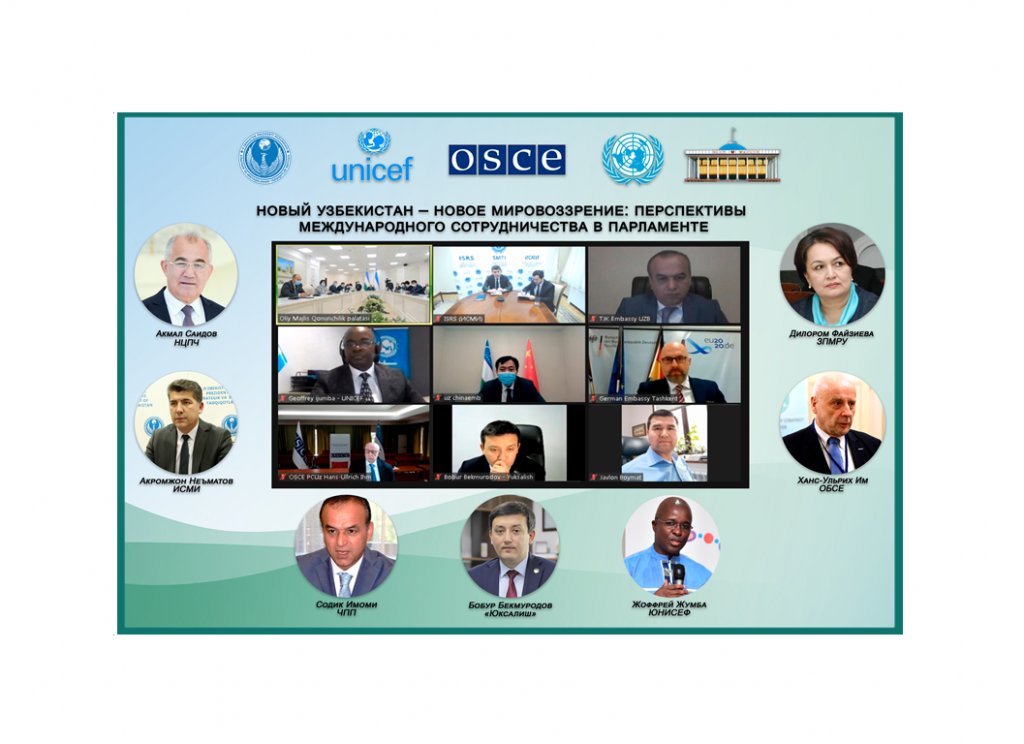
On December 23, a virtual meeting of the international discussion club on “New Uzbekistan – a new worldview: prospects of international cooperation in parliament” was held. The event was organized by the Legislative Chamber of the Oliy Majlis in cooperation with ISRS and “Yuksalish” Nationwide Movement.
The virtual discussion was attended by deputies of the Oliy Majlis, representatives of civil society institutions, research and analytical structures, diplomatic missions and international organizations (OSCE, UN, UNICEF) accredited in Uzbekistan, as well as the media.
At the meeting, views were exchanged on the conceptual issues of forming a new image of Uzbekistan in the international arena. Modern directions and main priorities of the country’s foreign policy activity, as well as the results of the comprehensive work carried out in recent years in foreign policy were discussed.
First Deputy Speaker of the Legislative Chamber Akmal Saidov focused on the growing role of Uzbekistan in shaping not only the regional, but also the global agenda that directly affects the security and sustainable development of the international community.
Mr. Akmal Saidov touched upon the issue of strengthening the role of parliamentary diplomacy in the new Uzbekistan’s foreign policy. According to him, today the parliament, which traditionally plays an important role in creating the legal basis for bilateral and multilateral relations with foreign countries and international organizations, is becoming an important mechanism for implementing the goals and objectives of the renewed Uzbekistan.
In this context, the adoption of the Concept of Parliamentary Diplomacy of the Republic of Uzbekistan in the legislative body and formation of 48 inter-parliamentary friendship groups in recent years were indicated.
ISRS First Deputy Director Akromjon Nematov emphasized that today the Oliy Majlis is turning into a full-fledged subject in formation of the foreign policy agenda and takes on the role of a reliable guide of the country’s foreign policy priorities and national interests in the international arena.
In his report, the ISRS expert also presented a comprehensive systemic analysis of the most important changes in Uzbekistan’s foreign policy, which highlighted the distinctive features, basic principles and goals of the new foreign policy strategy that shape the image of New Uzbekistan.
The main guiding principles are the imperatives of multilateralism, proactivity, openness, constructivism, pragmatism and humanism, as well as peacefulness and good neighborliness.
A. Nematov also paid special attention to the constructive, pragmatic and peaceful nature of the newly introduced foreign policy, which is based on the principles of mutual trust and mutual consideration of interests. The practical implementation of these approaches, according to the expert, contributed to the settlement of problems accumulated in Central Asia that hinder the development of interregional relations.
Supporting this opinion, the Ambassador of Tajikistan to Uzbekistan Sodiq Imomi noted that the regional policy of Uzbekistan, which meets the long-term fundamental interests of the entire region, has radically changed the political climate in Central Asia. The diplomat expressed his conviction that the positive changes taking place in the region are becoming irreversible.
Participants of the dialogue agreed that Tashkent’s use of new comprehensive approaches, which supplemented the previous model of the country’s foreign policy strategy with important adjustments, secures Uzbekistan’s status of a responsible and predictable partner in the international arena, as well as creates favorable external conditions for the country’s modernization and its economy on an innovative path of development. According to them, such a policy can serve as an exemplary model for many countries in conditions when international relations are experiencing a crisis of trust, a lack of dialogue and mutually beneficial cooperation.
UzA